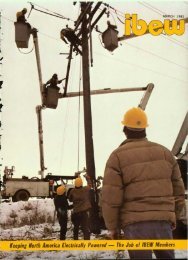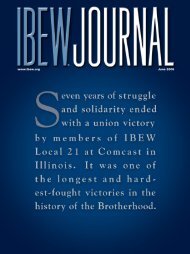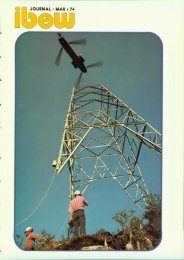1984-04 April IBEW Journal.pdf - International Brotherhood of ...
1984-04 April IBEW Journal.pdf - International Brotherhood of ...
1984-04 April IBEW Journal.pdf - International Brotherhood of ...
You also want an ePaper? Increase the reach of your titles
YUMPU automatically turns print PDFs into web optimized ePapers that Google loves.
SUPREME COURT BANKRUPTCY RULING<br />
THREATENS COLLECTIVE BARGAINING<br />
Organized labor will step up ItS efforts<br />
to move Congress to amend the federal<br />
bankruptcy code as a result <strong>of</strong> the recem<br />
U.S. Supreme Court mhng which permits<br />
even solvent compames to ImmedIately<br />
cancel umon contracts by Ahog<br />
for bankruptcy.<br />
Pluggmg what labor considers to be a<br />
gaping and unfair loophole In the bankruptcy<br />
law now "has the lOp prlom)' on<br />
labor's agenda, -, AFL-C10 Legislative DIrector<br />
Ray ncm.~on hll .~ ~:l1cl<br />
Labor leaders attendmg the AFL·CIO<br />
Executive Council meeting In Sal Harbour,<br />
Florida, when the deciSion was<br />
handed down expressed dismay Imd anger.<br />
Bm they added that the ruling W3S<br />
not u nexpected and thaI legislation has<br />
been introduced to correct H .<br />
The AFL-CIO, saId the Council, will<br />
"do everything in ItS power to ensure<br />
that Congress corrects the Supreme Court<br />
mistakc and vindicates national labor<br />
policy."<br />
The CounCil declared, "The Supreme<br />
Court <strong>of</strong> the United St:ltes, in accordance<br />
with It s normal pro-business lealllngs,<br />
has now granted employers Wide permission<br />
to use the banknlptcy laws to<br />
destIoy collecuve bargallllng agreements_<br />
"The Supreme Court was able to make<br />
tlll:S JCI.:ISlon because Congress has not<br />
spelled out the proper relationship between<br />
the bankruptcy laws and the labor<br />
laws," the Council continued.<br />
"Given an opening. the Court'S conservative<br />
majority fashioned a legal rule<br />
that is best for busllless and worst for<br />
workers," it said.<br />
The high Court's February 22 rullllg<br />
carne in two parts, the first part unanimous<br />
and the second spin ;'j-4.<br />
In the unanimous deCision, the Court<br />
ruled that a bankruptcy COUrt may free<br />
a company from Its union contracts with<br />
Out requITIng pro<strong>of</strong> that the COntr3CtS<br />
thre3ten the comp3ny's survival. The<br />
company must Simply show that the<br />
contracts arc a financial "burden."<br />
In the closely spilt rullllg. the Coun<br />
said a company m3Y abrogate a coll ccllve<br />
bargaimng agreement as soon as It files<br />
for bankruptcy while awaltlllg the deci'<br />
sion <strong>of</strong> a bankruptcy Judge . The hank·<br />
ruptcy court could later restore the<br />
contract by rejecting the bankruptcy<br />
petition.<br />
The Council noted that the COUrt rnaiority<br />
in the 5-4 ruling h3d ignored lhe<br />
reasoning <strong>of</strong> a minority dissent written<br />
by Associate lustlee Wilham I. Brennan,<br />
J" Brcn n"" Wlute that the malorlty "Ius<br />
completely Ignored Important poliCies<br />
that underlie the National whor Rela ·<br />
tlons ACt " <strong>of</strong> 1935 In pcrn1lttlng a com·<br />
pany " Unilaterally to alter ;I collective<br />
bargaining agreement "<br />
Pernllttlng thiS, s[lId Brennan, l!o a<br />
"threat to bbor peace." He added 1113t<br />
the mllng will mean that " resolution <strong>of</strong><br />
the parlles' disputes will indeed be left<br />
to the relative slfcngth <strong>of</strong> the comendlll)::<br />
forces. "<br />
A~ I'xamplcs, Hrennan notes that the<br />
union workers at Continental Airlines<br />
and Wilson Foods had gone on strike<br />
after the compames last year tore up<br />
their contracts.<br />
The effect <strong>of</strong> the rullllg on the Conti·<br />
nental case was uncle:I!. Airlines 3re<br />
covered by the Railway Labor Act rather<br />
than the NLRA. The Court noted that<br />
Its ruling pertained to contracts under<br />
the N LRA, not the Railway Labor Act,<br />
where the bonkmptcy l:iw is specially<br />
restricted from being used to get OUI <strong>of</strong><br />
union contracts.<br />
AFL-CIO Spl.: .... lal Ce wa.,><br />
movlllg through the coun s, Contlllental<br />
Alrltnes last September used the bank·<br />
ruptcy petition deVIce 10 cancel colleclive<br />
ba rg:lllllllg agreements with pilots,<br />
flJght 3t!endants and machinists even<br />
though the company wasn't short <strong>of</strong> cash<br />
or :lbout 10 collapse. The :lidines' unions<br />
arc sull on Strike and the AFL-CIO has<br />
c311ed a national boycol! 10 support them.<br />
AFL-CIO attorney Gold noted that followlllg<br />
the enactment <strong>of</strong> b:mkruptcy law<br />
amendments in 1978, making it easier<br />
for both companies and individuals to<br />
declare -bankmptey, there has been a<br />
trend by employers to usc bankruptcy to<br />
break or weaken ItS unIOns.<br />
Gold s;ud the Supreme Court ruling,<br />
unless reversed by Congress, will " Lll <br />
crease the level <strong>of</strong> distress between employers<br />
and unIOns, lllercase the number<br />
uf lalNI Jll>pl,Jlt;~, "ud ClcalC greater lli'<br />
stabilIty in coll ective bargallling."<br />
Regardlllg the court 'S standard that<br />
companies seeking to void thelT union<br />
contracts through bankruptcy need only<br />
show that the contracts 3fe a "burden,"<br />
Cold said "collective bargaming agree·<br />
ments arc always, If they're worth the<br />
paper they're wnttcn Oil, an economic<br />
burden on employers-cverybody would<br />
Itkc 10 pay the mmlmum wage or<br />
below."<br />
Edllor'. NOle : As this issue <strong>of</strong> the <strong>Journal</strong><br />
was going to press late in March the U.S.<br />
House <strong>of</strong> Representatives passed legis·<br />
lation 10 save bankruptcy COl/rlS lrom a<br />
March 30 shutdown while saleguarding<br />
labor oonllacts from lirms that want them<br />
scrapped during bankruptcy proceedings.<br />
Similar legislation hali been passed by<br />
the Senate. The legislation. which is elfpected<br />
to go to joint Conference Committee<br />
shorlly to Iron out any dil/erences<br />
botween the House and Senate versions.<br />
is aimed at rescuing a bankruptcy system<br />
that the Supreme Court declared unconstitutional.<br />
Eventual passage <strong>of</strong> such leg·<br />
Islliliun is a top priority for organized labor.<br />
Nelft month's <strong>Journal</strong> will carry more de·<br />
ta!!s on this importa nt legislation as it<br />
moves toward enactment Into law.<br />
•<br />
12 \ <strong>IBEW</strong> JOURNAL I APRIL <strong>1984</strong>

















